The function of IgE is:
activation of B-cells
mediate in allergic response
present on lymphocyte surface as receptors
protection from inhaled and ingested pathogens
The correct Answer is:B
To determine the function of IgE, let's analyze each option provided in the question step by step.
Step 1: Evaluate the first option - Activation of B cells
- Analysis: The activation of B cells is primarily associated with IgD immunoglobulin. Therefore, this option is incorrect.
- Hint: Remember that IgD is specifically involved in the activation of B cells.
Step 2: Evaluate the second option - Mediate in allergic responses
- Analysis: IgE is known for its role in mediating allergic responses. It binds to allergens and triggers histamine release from mast cells and basophils, leading to inflammation and allergy symptoms. This option is correct.
- Hint: Think about how allergies manifest and the role of IgE in that process.
Step 3: Evaluate the third option - Presence of lymphocyte surface as receptor
- Analysis: The receptors present on lymphocytes are primarily Major Histocompatibility Complex (MHC) molecules, not IgE. Thus, this option is incorrect.
- Hint: MHC molecules are crucial for antigen presentation, not IgE.
Step 4: Evaluate the fourth option - Protection from inhaled and ingested pathogens
- Analysis: Protection from inhaled and ingested pathogens is mainly provided by phagocytes and other immune cells, not IgE. Therefore, this option is also incorrect.
- Hint: Consider which immune cells are primarily responsible for protecting against pathogens.
Step 5: Evaluate the last option - Stimulation of complement system, passive immunity to phytos
- Analysis: IgE does not stimulate the complement system; that role is more associated with IgM and IgG. Additionally, while IgE can cross the placenta, it is not primarily known for providing passive immunity. This option is incorrect.
- Hint: Recall which immunoglobulins are known for complement activation and passive immunity.
Conclusion
After evaluating all the options, the correct function of IgE is to mediate allergic responses. Therefore, the answer is:
Correct Answer: Mediate in allergic responses (Option B)
- Analysis: The activation of B cells is primarily associated with IgD immunoglobulin. Therefore, this option is incorrect.
- Hint: Remember that IgD is specifically involved in the activation of B cells.
- Analysis: IgE is known for its role in mediating allergic responses. It binds to allergens and triggers histamine release from mast cells and basophils, leading to inflammation and allergy symptoms. This option is correct.
- Hint: Think about how allergies manifest and the role of IgE in that process.
- Analysis: The receptors present on lymphocytes are primarily Major Histocompatibility Complex (MHC) molecules, not IgE. Thus, this option is incorrect.
- Hint: MHC molecules are crucial for antigen presentation, not IgE.
- Analysis: Protection from inhaled and ingested pathogens is mainly provided by phagocytes and other immune cells, not IgE. Therefore, this option is also incorrect.
- Hint: Consider which immune cells are primarily responsible for protecting against pathogens.
- Analysis: IgE does not stimulate the complement system; that role is more associated with IgM and IgG. Additionally, while IgE can cross the placenta, it is not primarily known for providing passive immunity. This option is incorrect.
- Hint: Recall which immunoglobulins are known for complement activation and passive immunity.
After evaluating all the options, the correct function of IgE is to mediate allergic responses. Therefore, the answer is:
Topper's Solved these Questions
- BASIC CONCEPTS OF IMMUNOLOGYBOOK - GRB PUBLICATIONCHAPTER - BASIC CONCEPTS OF IMMUNOLOGYEXERCISE - ACTIVE AND PASSIVE IMMUNITY
10 Videos
- BASIC CONCEPTS OF IMMUNOLOGYBOOK - GRB PUBLICATIONCHAPTER - BASIC CONCEPTS OF IMMUNOLOGYEXERCISE - ALLERGY
24 Videos
- BASIC CONCEPTS OF IMMUNOLOGYBOOK - GRB PUBLICATIONCHAPTER - BASIC CONCEPTS OF IMMUNOLOGYEXERCISE - ANTIGENS
9 Videos
- ANIMAL HUSBANDRYBOOK - GRB PUBLICATIONCHAPTER - ANIMAL HUSBANDRYEXERCISE - NCERT CORNER
36 Videos
- BIODIVERSITY AND CONSERVATIONBOOK - GRB PUBLICATIONCHAPTER - BIODIVERSITY AND CONSERVATIONEXERCISE - NCERT CORNER (EXEMPLAR PROBLEMS)
30 Videos
Similar Questions
A moving coil galvanometer is a sensitive device which can be used as a detector to check if a curretn is flowing in a circuit. A galvanometer works on the principle that a current carrying coil placed in a radial magnetic field experiences a deflecting torque whose magnitudes is directly proportional to the electric current passing through it. The deflection ϕ is indicated by a pointer and is give as ϕ=NABk⋅I.
A galvonometer can be used to measure electric current flowing througha circuit direcly in ampere and its submultiples. For this purpose we join a small resistance 'rs' in parallel to the galvonometer. Such a shunted galvonometer is called an ammeter. If a galvanomter, having a resistance RG, givens full scale deflection for a current Ig and we want to measure a current ranging from 0−IgA, then the value of shunt resistance will be
rs=RG⋅IgI−Ig
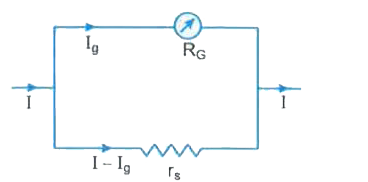
What is the net resistance of shunted galvanomter?
View SolutionA moving coil galvanometer is a sensitive device which can be used as a detector to check if a curretn is flowing in a circuit. A galvanometer works on the principle that a current carrying coil placed in a radial magnetic field experiences a deflecting torque whose magnitudes is directly proportional to the electric current passing through it. The deflection ϕ is indicated by a pointer and is give as ϕ=NABk⋅I.
A galvonometer can be used to measure electric current flowing througha circuit direcly in ampere and its submultiples. For this purpose we join a small resistance 'rs' in parallel to the galvonometer. Such a shunted galvonometer is called an ammeter. If a galvanomter, having a resistance RG, givens full scale deflection for a current Ig and we want to measure a current ranging from 0−IgA, then the value of shunt resistance will be
rs=RG⋅IgI−Ig
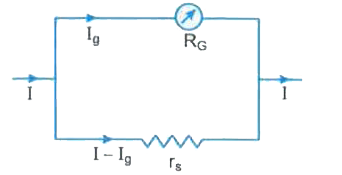
How is a radial magnetic field obtained?
View Solution
Knowledge Check
During an allergic reaction, the binding of antigens to IgE antibodiess initiates a response, in which chemicals cause the dilation of blood vessels and a host of other physiological changes. Such chemicals are
AinterferonsBhormonesChistamineDacetylamine
Onto function (Surjective function) and Into functions
View SolutionA moving coil galvanometer is a sensitive device which can be used as a detector to check if a curretn is flowing in a circuit. A galvanometer works on the principle that a current carrying coil placed in a radial magnetic field experiences a deflecting torque whose magnitudes is directly proportional to the electric current passing through it. The deflection ϕ is indicated by a pointer and is give as ϕ=NABk⋅I.
A galvonometer can be used to measure electric current flowing througha circuit direcly in ampere and its submultiples. For this purpose we join a small resistance 'rs' in parallel to the galvonometer. Such a shunted galvonometer is called an ammeter. If a galvanomter, having a resistance RG, givens full scale deflection for a current Ig and we want to measure a current ranging from 0−IgA, then the value of shunt resistance will be
rs=RG⋅IgI−Ig
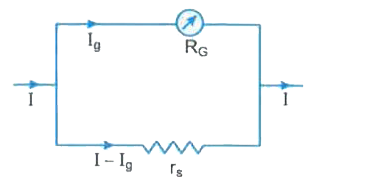
There is a moving coil galvonometer in which there are 30 divisions on either side of central zero mark. It gives full scale deflection for a current of 600μA. What is its current sensitivity ?
View SolutionA moving coil galvanometer is a sensitive device which can be used as a detector to check if a curretn is flowing in a circuit. A galvanometer works on the principle that a current carrying coil placed in a radial magnetic field experiences a deflecting torque whose magnitudes is directly proportional to the electric current passing through it. The deflection ϕ is indicated by a pointer and is give as ϕ=NABk⋅I.
A galvonometer can be used to measure electric current flowing througha circuit direcly in ampere and its submultiples. For this purpose we join a small resistance 'rs' in parallel to the galvonometer. Such a shunted galvonometer is called an ammeter. If a galvanomter, having a resistance RG, givens full scale deflection for a current Ig and we want to measure a current ranging from 0−IgA, then the value of shunt resistance will be
rs=RG⋅IgI−Ig
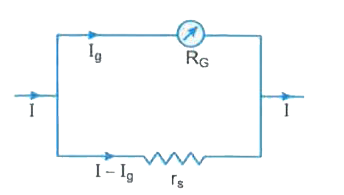
Why do we use a radial magnetic field in a moving coil galvonometer?
View SolutionA moving coil galvanometer is a sensitive device which can be used as a detector to check if a curretn is flowing in a circuit. A galvanometer works on the principle that a current carrying coil placed in a radial magnetic field experiences a deflecting torque whose magnitudes is directly proportional to the electric current passing through it. The deflection ϕ is indicated by a pointer and is give as ϕ=NABk⋅I.
A galvonometer can be used to measure electric current flowing througha circuit direcly in ampere and its submultiples. For this purpose we join a small resistance 'rs' in parallel to the galvonometer. Such a shunted galvonometer is called an ammeter. If a galvanomter, having a resistance RG, givens full scale deflection for a current Ig and we want to measure a current ranging from 0−IgA, then the value of shunt resistance will be
rs=RG⋅IgI−Ig
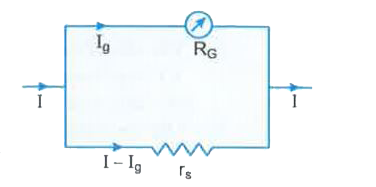
If you want to measure a current ranging 0 - 1.5 A using the above galvonometer. What shunt resistance should be joined with it ? Resistance of galvanometer coil is 300Ω.
View SolutionThe composition of any function with the identity function is the function itself.
View SolutionInverse function|| Bounded function || Explicit & Implicit function
View SolutionHomogeneous Function || Bounded function || Identity function|| Explicit and implicit function || Even and odd function
View Solution
